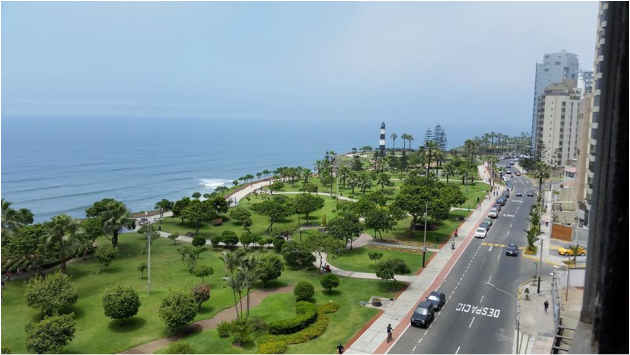 The view from our apartment in Lima, Peru. The view from our apartment in Lima, Peru. I have been in Lima, Peru for two days now. We flew in near 1 AM, and arrived at the apartment we’re renting at just about 3 AM. The view on the website was incredible, but as we drove up the cliffs of the Peruvian shore, winding our way past rocky beaches, I could tell that the website was not lying: this view is breathtaking. Oddly enough, it is not this view or this apartment that is the most exciting part of this trip. Upon meeting up with the four students who had attended the first week, after confirming everyone was okay and everyone was happy, we asked: “How has the COP been?” COP 20 is the 20th Conference of Parties hosted by the United Nations Framework Convention on Climate Change (UNFCCC). It is a conference that spans over two weeks, and we are lucky enough to have students attend and observe at both weeks. And despite after well over 12 hours of travelling, being in a foreign country where not many of us speak Spanish, and, oh yeah, it was 3 AM – we still stayed up for an hour talking about the previous week’s events. At 4 AM, we dragged ourselves to bed. The next two days, since the COP was pretty much closed and we all knew we would have no time during the week, we did our share of sightseeing – but every spare moment, whether we were walking or sitting at dinner, was filled with talk of the COP. “What do you expect?” “What did you take out of it?” “Who did you talk to?” And, the most important question whenever you travel to a foreign country, “How was the food?” But in all seriousness, climate change was the talk of our group. The students from the first week got to meet so many people – important people – everywhere at the conference. Ranging from seeking them out after an informational session to sitting next to them on the bus, they were surrounded with appointed delegates from countries all over the world (from Japan to Paraguay to Brazil to the USA). All of us, students in the United States, presented with this once-in-a-lifetime opportunity to really get involved in what’s going on. More accurately: in our future. Sitting so close to the Pacific Ocean as I type this, I can only look out and think and lament the day that a hurricane might come destroy this very shore. I can only thank that that day is not today, but with our planet’s climate changing so swiftly, who knows what might happen next year? From what the first week students have told us, though, there’s one thing that we have. There’s hope. After all, a conference such as the COP wouldn’t exist without hope. People wouldn’t be trying to fight for the future of our planet if they didn’t think it could be saved. Do we have very serious consequences coming our way if we don’t change? Yes, absolutely. But that’s the greatest thing about climate change: it is completely within our power to change; to stop; to reverse. The chance to attend this COP is a change in a lifetime for us. But, I know at least for me, it put a lot of the issues of climate change into perspective. And most importantly, we are not just here to observe. We are here to learn. And we will learn how to change the future.
0 Comments
Leave a Reply. |
Categories
All
Archives
March 2024
|
 RSS Feed
RSS Feed
